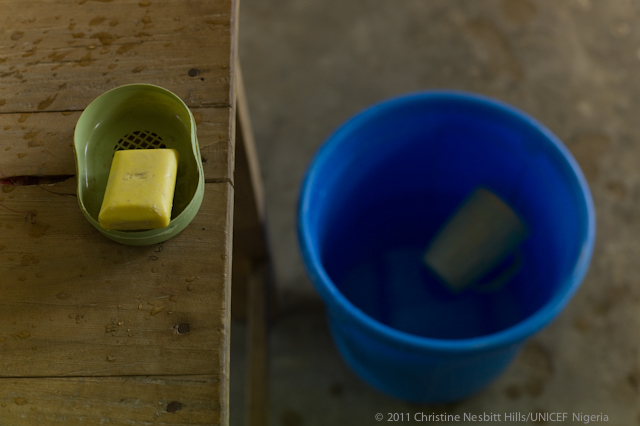(ABOVE) Soap and water is seen during a handwashing demonstration at the primary school in the Odot Uyi community in Odukpani Local Government Area (LGA) in Cross-River State in Nigeria on July 21, 2011. This community is supported in the development of water, sanitation and hygiene practices through funding of the EU and UNICEF.
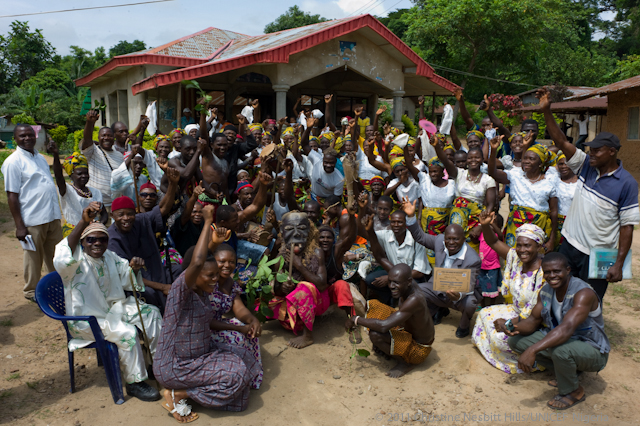
Members of the community are seen with their open defecation free status certificate in Emikwor community in Abi Local Government Area (LGA) in Cross-River State in Nigeria on Tuesday 19 July 2011. Emikwor received their open defecation free (ODF) certification in February 2011.
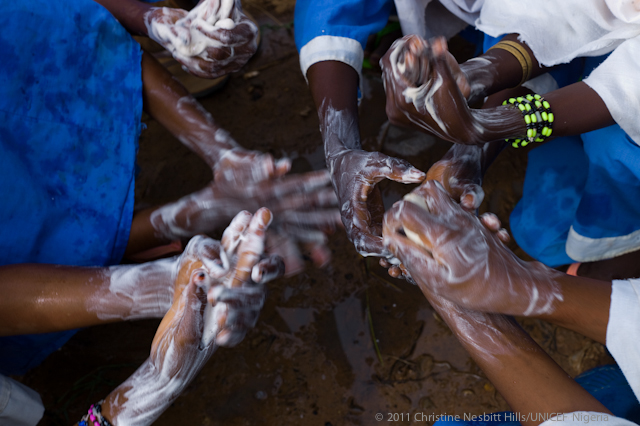
Learners wash their hands at school in Kantoga community in Birnin Kudu Local Government Area (LGA) in Jigawa State in Nigeria on July 28, 2010. The development of water, sanitation and hygiene practices in this LGA are supported by the EU and UNICEF.
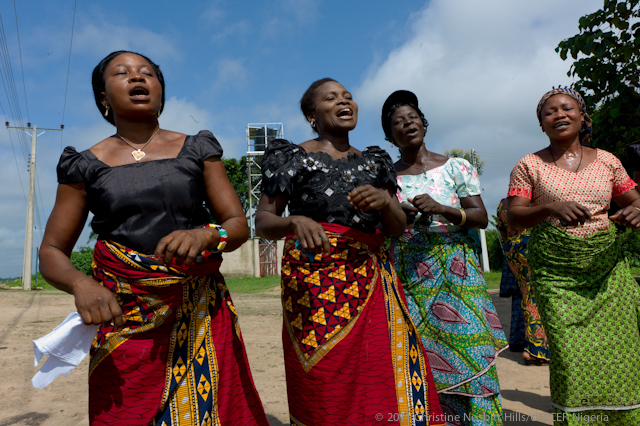
The Women’s Group in Ekpeti community sing and dance to mobilise their community around issues of water, sanitation and hygiene on July 18, 2011 in Yaurr Local Government Area (LGA) in Cross-River State, Nigeria. The community is certified as 100% open defecation free and will be monitored to see it retains its status.
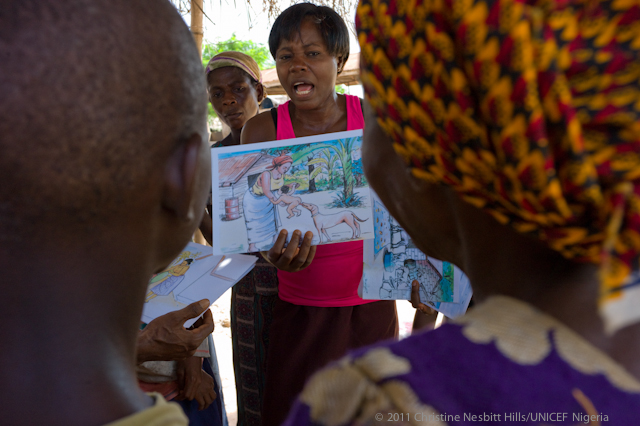
Volunteer Hygiene Promoters visit a household in the Ajere Beach community in Yakurr Local Government Area (LGA) in Cross-River State in Nigeria on July 19, 2011.
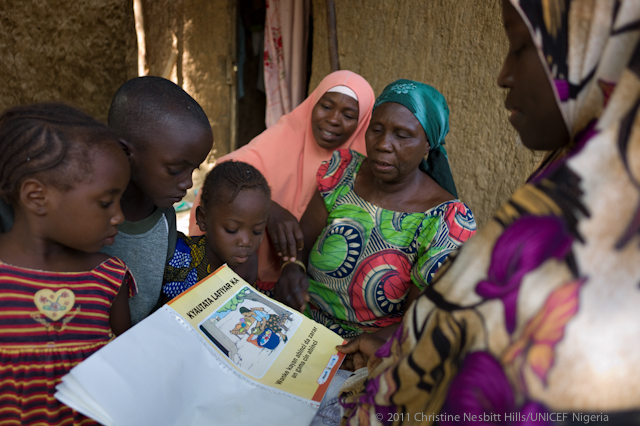
Volunteer Hygiene Promoters visit a household in Gavin Baki community in Gumel Local Government Area (LGA) in Jigawa State in Nigeria on July 26, 2011. The development of water, sanitation and hygiene practices in this LGA are supported by the EU and UNICEF.
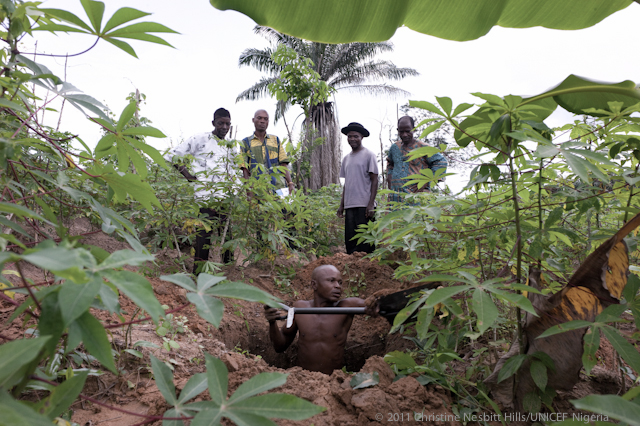
Ofem Ekwe Atang digs a hole for a pit latrine near his cassava fields at his home in Afroekpe Ekori community in Yakur Local Government Area (LGA) in Cross-River State in Nigeria on Friday July 22, 2011. Seen behind him, from left to right are: Chief Uket Ibiang (community VLOM artisan), Bassey Etim Eko (town council secretary), Sunday Ibor Ubangha (WASHCOM chairman) and Usang Ebali Egde (town council chairman). Homeowner Atang is digging another pit latrine as the first one he constructed in 2009 is now becoming full. Atang lives with his wife and three children and says, “At first, we were resistant to the message that the WASHCOM was bringing us, but with time we came to realise that we needed to end open defecation. Now, our family won’t go back to that. My family is healthy and we can see the benefits of good hygiene and sanitation”.
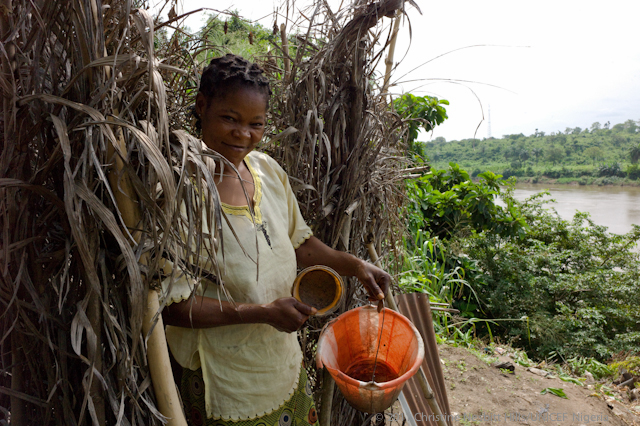
Faith Patrick Lebo is seen at her pit latrine in Emikwor community in Abi Local Government Area (LGA) in Cross-River State, Nigeria on July 19, 2011. Lebo is holding the ashes used to cover faeces and the container the family used to store used toilet tissue paper before it is burned. Before the pit latrine was constructed at Lebo’s home, her family used to defecate in the open bush near their homestead, a place further than where she walked to fetch water. Lebo says “I used to be very shy to go to the the toilet because everyone could see me, I would have to wait until the area was empty”. Lebo has four children between the ages of 21 and 4 years old. Only the last-born child has been able to grow up without defecating in the open. Lebo says “it’s very easy to enjoy my toilet, it’s very close by.” Before the family used a pit latrine, the children used to suffer from rashes, cholera, typhoid, fever. “But now, we are free” says Lebo speaking of life after ending open defecation.
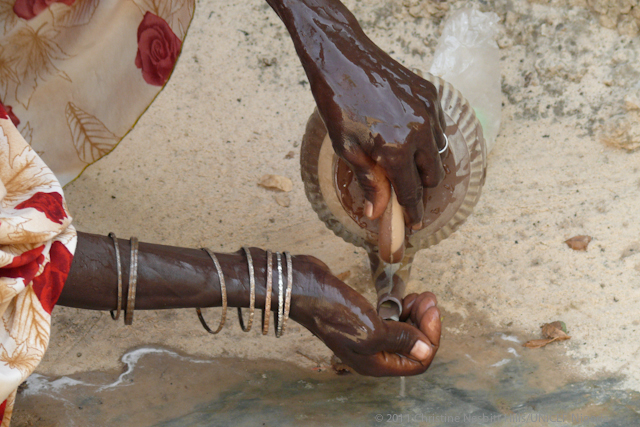
A woman washes her hands next to her latrine at her home in Gavin Baki community in Gumel Local Government Area (LGA) in Jigawa State in Nigeria on July 26, 2011. The development of water, sanitation and hygiene practices in this LGA are supported by the EU and UNICEF.
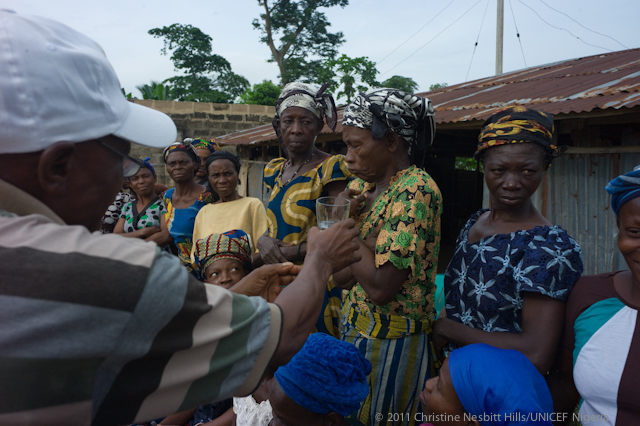
Women in the Eminekpan community in Abi Local Government Area (LGA) in Cross-River State in Nigiera shun a glass of water after it’s been contaminated by human faeces during a triggering exercise on Tuesday July 19, 2011. Eminekpan community practices open defecation and during a transit walk with LGA water and sanitation mobiliser Pastor Joseph Ekpata identified the areas where people collect water and the location of the community’s open defecation site. Once back in the open air meeting area, Ekpata took the community through an exercise to trigger the process of community-led total sanitation (CLTS). Ekpata offered drinks of water to the community in a clear glass. Several of the community responded and drank water. Ekpata then drew a hair through the human faeces collected at the defecation site, dipped it in the glass of water and offered it to the community to drink. No one accepted the water despite how clear it looked, and this exercise made apparent the links between open defecation andthe flies that transport human faeces to food and homes in the community and diseases such as cholera. Ekpata says, “The community can immediately identify with the exercise. One can see the disgust and shame on the faces of the community as they realise that they are eating and drinking their own faeces. It’s rare that the community doesn’t immediately respond to the invitation to become a open defecation free (ODF) community.” The Eminekpan community formed a water and sanitation committee to ensure that the community builds their own latrines at each household within two months. In response to the community’s sentiment that they are waiting for the government to build latrines in their homes, Ekpata says, “Its not that you should wait for the government, rather ask what you can do for yourselves right now”. On the outskirts of the community, at the bottom of a short steep hill that is the road to the community, stand unused latrines and a broken well.
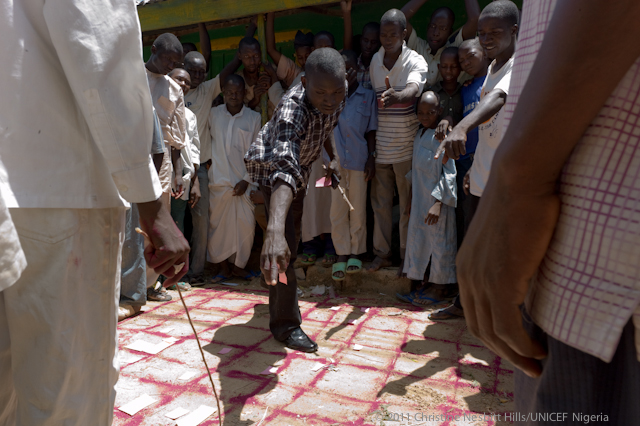
Male community members ‘map’ their community showing where the open defecation sites are in relation to the homes and water sources in Majia community in Taura Local Government Area (LGA) in Jigawa State, Nigeria on July 26, 2011. ‘Mapping’ is a process used within communities by faciliators of Community-Led Total Sanitation (CLTS) to bring about a community led response to sanitation issues in the community.
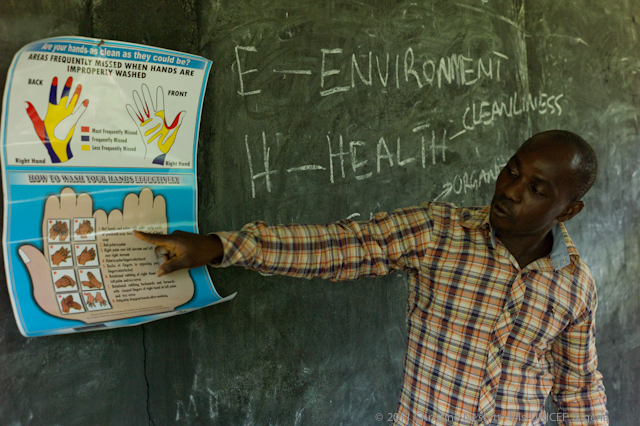
Johnson Abang from the LGA WASH Dept. addresses a class at the Odot Uyi community in Odukpani Local Government Area (LGA) in Cross-River State in Nigeria on July 21, 2011. This community is supported in the development of water, sanitation and hygiene practices through funding of the EU and UNICEF.
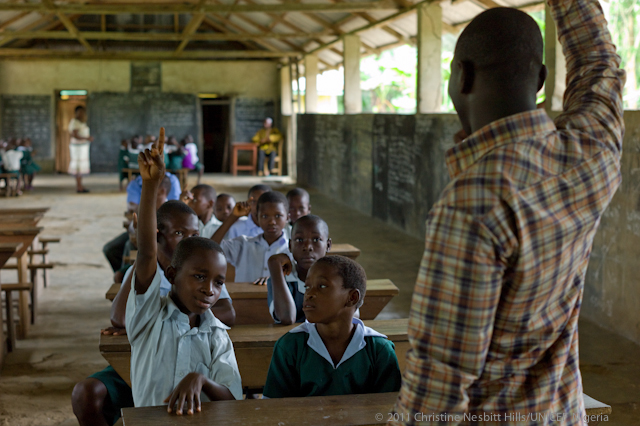
Johnson Abang from the LGA WASH Dept. addresses a class at the Odot Uyi community in Odukpani Local Government Area (LGA) in Cross-River State in Nigeria on July 21, 2011. This community is supported in the development of water, sanitation and hygiene practices through funding of the EU and UNICEF.
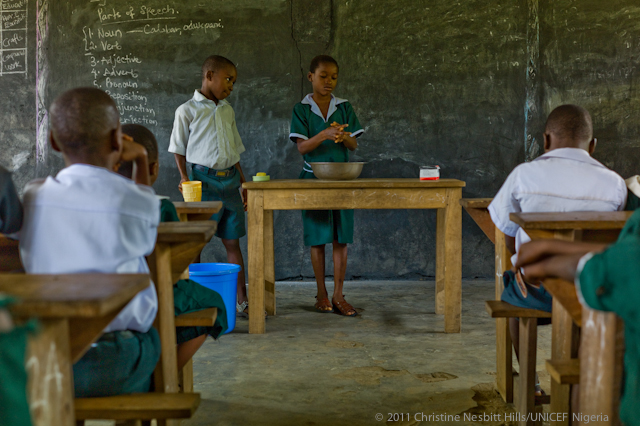
A young boy and girl from the Environmental Health Club demonstrate handwashing at the primary school in the Odot Uyi community in Odukpani Local Government Area (LGA) in Cross-River State in Nigeria on July 21, 2011. This community is supported in the development of water, sanitation and hygiene practices through funding of the EU and UNICEF.
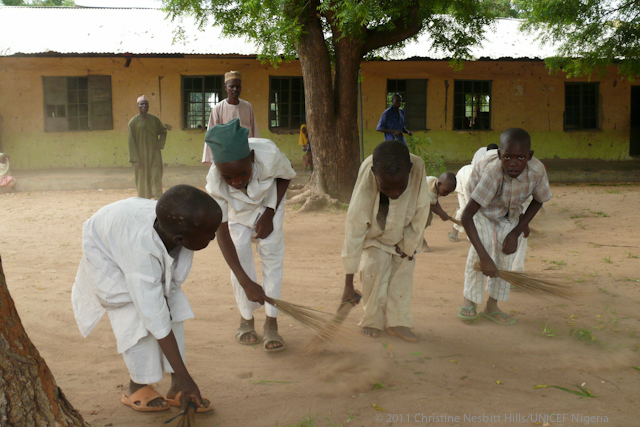
Learners clean the school environment in Kantoga community in Birnin Kudu Local Government Area (LGA) in Jigawa State in Nigeria on July 28, 2010. The development of water, sanitation and hygiene practices in this LGA are supported by the EU and UNICEF.
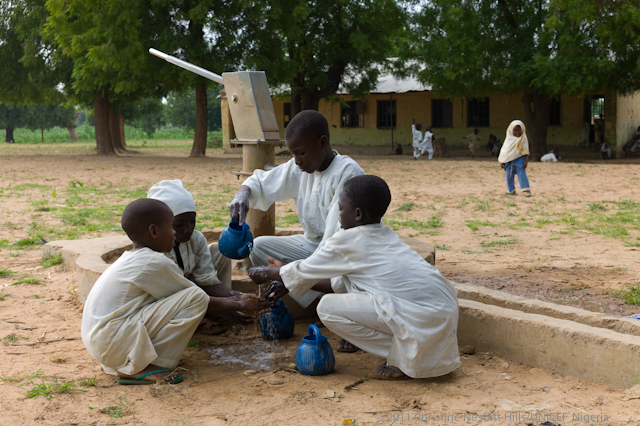
Learners wash their hands at school in Kantoga community in Birnin Kudu Local Government Area (LGA) in Jigawa State in Nigeria on July 28, 2010. The development of water, sanitation and hygiene practices in this LGA are supported by the EU and UNICEF.
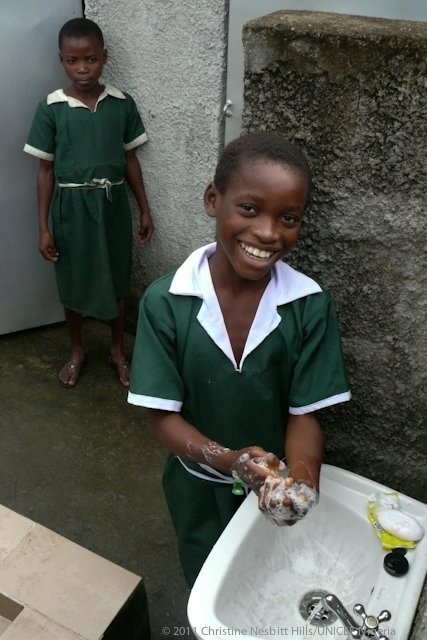
A young girl washes her hands after cleaning the latrines at the primary school in the Odot Uyi community in Odukpani Local Government Area (LGA) in Cross-River State in Nigeria on July 21, 2011. This community is supported in the development of water, sanitation and hygiene practices through funding of the EU and UNICEF.
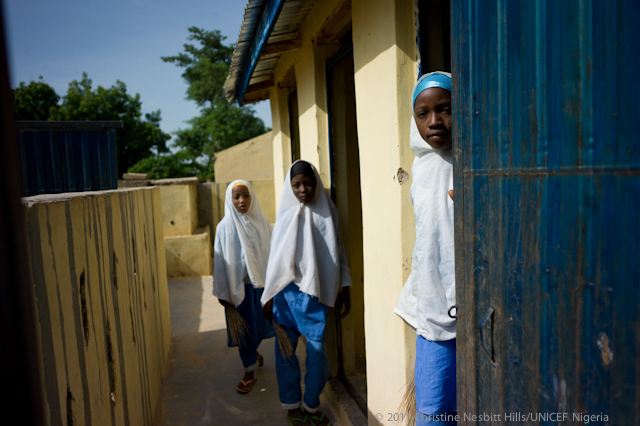
Schoolgirls are seen outside the latrines after cleaning at school in Kantoga community in Birnin Kudu Local Government Area (LGA) in Jigawa State in Nigeria on July 28, 2010. The development of water, sanitation and hygiene practices in this LGA are supported by the EU and UNICEF.
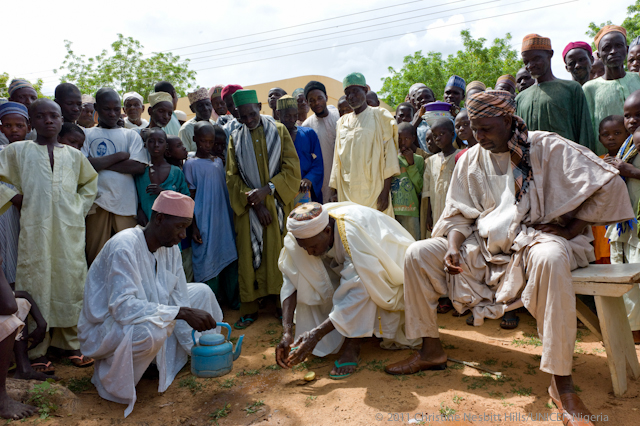
Mallam Mohammed Datti Liman performs a handwashing demonstration after Friday afternoon prayers at the Kantoga Mosque in Birnin Kudu Locak Government Area (LGA) in Jigawa State, Nigeria on July 29, 2011. Seated to the right of the Imam is the village head Umar Aliyu.
